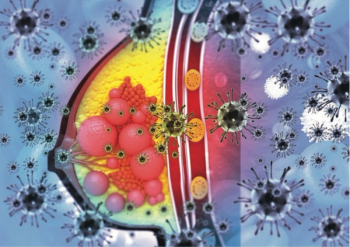
With a de-escalation strategy for administration of trastuzumab and pertuzumab in the neoadjuvant setting, patients with HER2-positive, hormone receptor–negative breast cancer experienced high rates of response and survival.

Your AI-Trained Oncology Knowledge Connection!


With a de-escalation strategy for administration of trastuzumab and pertuzumab in the neoadjuvant setting, patients with HER2-positive, hormone receptor–negative breast cancer experienced high rates of response and survival.

Ribociclib (Kisqali) plus fulvestrant (Faslodex) maintained significantly improved overall survival (OS) rates after nearly 5 years of follow-up compared to fulvestrant alone in postmenopausal patients who had hormone receptor (HR)-postivie, HER2-negative advanced breast cancer.

Venetoclax plus fulvestrant did not result in better outcomes compared to fulvestrant alone in previously treated patients who had locally advanced or metastatic estrogen receptor–positive, HER2-negative breast cancer.

Palbociclib plus fulvestrant maintained a clinically meaningful overall survival improvement compared to placebo plus fulvestrant after a median follow-up of 73.3 months in patients with HR-positive, HER2-negative advanced breast cancer.

Data from the OlympiA trial support olaparib use in certain patients with BRCA1/2–positive early breast cancer.

The D-CARE study found adjuvant denosumab is devoid of benefits in high-risk early breast cancer.

The use of a four-gene signature identified a series of subgroups of triple-negative breast cancer, including one subtype that was responsive to platinum-based chemotherapy in the metastatic setting.

For premenopausal breast cancer patients, 24 weeks of neoadjuvant chemotherapy may yield a better clinical response than endocrine therapy.

A novel high-intensity sequencing approach enabled broad detection of genomic variants in plasma with high rates of concordance with corresponding tumor tissue in patients with metastatic breast, lung, and prostate cancer.

Dual HER2 blockade was superior to single blockade in postmenopausal women with HER2-positive, HR-positive metastatic breast cancer.

The addition of pertuzumab to trastuzumab and chemotherapy improved invasive disease–free survival in patients with HER2-positive early breast cancer.

The investigational third-generation nonsteroidal oral selective estrogen receptor degrader RAD1901 was associated with a 23% objective response rate among 40 heavily pretreated women with estrogen receptor (ER)-positive, HER2-negative breast cancer.

Adding ipatasertib to first-line paclitaxel modestly improved progression-free survival in women with triple-negative breast cancer.

This video examines results of a phase II trial that studied the combination of neratinib plus capecitabine for the treatment of recurrent brain metastases in HER2-positive breast cancer patients.

The PARP inhibitor olaparib increases progression-free survival and improves quality of life in BRCA-mutated HER2-negative metastatic breast cancer patients.

Abemaciclib plus fulvestrant was linked with improved response and PFS in patients with endocrine-resistant, HR-positive, HER2-negative metastatic breast cancer.

Palbociclib alone and in combination with endocrine therapy offers clinical benefit among women with HR-positive, HER2-negative metastatic breast cancer.

Breast cancer survivors, including those with estrogen receptor–positive tumors, can safely become pregnant, according to a new study.

Among breast cancer survivors, black women are far less likely to receive BRCA testing and preventive surgery than white or Hispanic women.

OPT-822/821 vaccination did not show any improvement in progression-free survival as maintenance therapy compared with placebo for metastatic breast cancer. But in those patients who had an immune response, the vaccine did appear to show activity.

Heavily pretreated women with metastatic breast cancer had significant improvements in progression-free survival and overall response rate when treated with the combination of utidelone plus capecitabine compared with capecitabine alone.

Postmenopausal women with early breast cancer benefit from extending AI therapy with letrozole from 5 to 10 years, and show no worsening of quality of life.

Directly engaging and recruiting patients online using social media will allow broader participation in cancer genomics research and hasten clinical advances.

The investigational biosimilar MYL-1401O has comparable efficacy and safety to the FDA-approved trastuzumab in metastatic HER2-positive breast cancer.

The prostate cancer drug enzalutamide has shown activity in women with advanced triple-negative breast cancer whose tumors express the androgen receptor.

Early trial results suggest that a copper-depleting agent may create an inhospitable environment for tumor progression in patients with breast cancer.

Performing a cavity shave margin in breast cancer patients undergoing partial mastectomy can reduce re-excision and positive margin rates after surgery.

Treatment of postmenopausal DCIS patients with the aromatase inhibitor anastrozole resulted in higher breast cancer–free survival rates compared with treatment with tamoxifen.

The addition of palbociclib to fulvestrant delayed disease progression in women with HR-positive, HER2-negative metastatic breast cancer.

As part of our coverage of the 2014 ASCO Annual Meeting, we discuss treatment strategies for breast cancer patients who harbor either the BRCA1 or BRCA2 mutation.